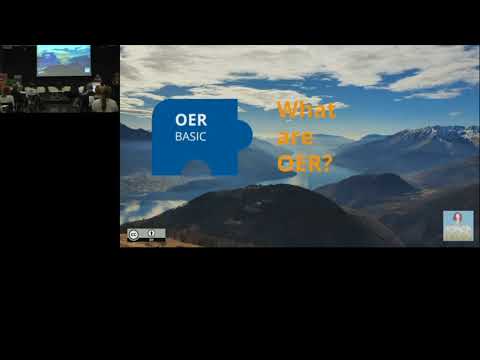This presentation tells the story of an Open Education Practice led by the European Network of Open Education Librarians (ENOEL) in 2021. Last year SPARC Europe and ENOEL members worked on designing and implementing advocacy tools (slides, leaflets, Twitter cards) to support the academic librarians in promoting and raising awareness of Open Education benefits for various stakeholders (from students to teachers to institutions to citizens). This activity was to help deliver on the UNESCO OER Recommendation, to build capacity with practical tools that librarians and advocates can easily reuse as they are or adapt to local needs and priorities with low-level effort. The result was the ENOEL Toolkit on OE Benefits.
Librarians of the network collected evidence-based references on the Benefits of Open Education, following the approach suggested by Neil Butcher, OER Africa, during an ENOEL webinar. Members finalised and prioritised the benefits through an online voting process. SPARC Europe then designed and developed the Toolkit in an open format and shared it using a CC BY licence on Zenodo (An ENOEL Toolkit: Open Education Benefits. Version 2 | Zenodo). The original language was English, the current lingua franca for the ENOEL network. However, this was insufficient to support the many languages spoken in the ENOEL network. We needed local languages to help them advocate for more Open Education in their institutions or countries. Europe has 24 recognised official languages, and English is not the native language for most in Europe. European librarians can benefit from local language versions to advocate even more effectively at their institutions or local or national levels. ENOEL members and their colleagues volunteered to work on 15 EU language versions of the Toolkit, in addition to the original English one. The process of localising the tools became an opportunity to involve more members in actively contributing to OE advocacy activities, creating more community subgroups and relationships, and seeing members organising their work with peers on a national level. They also collaborated across borders when members were no longer residents of their native country but still wanted to disseminate the OE benefits in their native languages. ENOEL members applied their service attitude as usual: where skills were not there yet, motivation drove members towards the results.
Great attention has been given to making and keeping the OE Benefits Toolkit as open as possible. Thanks to its graphic simplicity and its open licence, librarians who are willing to reuse it don’t need advanced skills to work with it. It has been designed to welcome the addition of institutional logos, changes in colours, and fonts to adapt to local communication guidelines, standards, and tools. Reusers can change the order of the benefits according to the preferences of each local context. At the beginning of each file, instructions guide users to understand each tool’s structure, correctly attribute it when adapting, and find items in the files themselves.
Thanks to the translation process, it was possible to prepare a second version of the original toolkit, enhanced according to the suggestions coming from the volunteers who translated them. For example, the current (Feb 2022) version of the OE Benefits Toolkit provides better guidance to create the attribution statements correctly.
This presentation will talk about this collaborative localisation process in creating an open advocacy tool for advocates of OE: the enthusiasm, the challenges, the timings, and the motivation that helped ENOEL members to overcome them to promote more inclusive and diverse participation in the Open Education arena. This resource helped many learn about the challenges of creating and adapting an OER; we look forward to sharing our journey.
Info
![]() Presented by:: Paola Corti, Monique Schoutsen
Presented by:: Paola Corti, Monique Schoutsen
![]() Conference Track: Thematic Session: Libraries and librarians
Conference Track: Thematic Session: Libraries and librarians
![]() Track Date/Time: 2022-05-23T14:40:00Z (your local time)
Track Date/Time: 2022-05-23T14:40:00Z (your local time)
![]() Language: English
Language: English
![]() Pretalx link: How about reconciling Babel? Inclusive approaches to advocacy tools. OE Benefits: an ENOEL Toolkit goes multilingual. :: Open Education Global 2022 :: pretalx
Pretalx link: How about reconciling Babel? Inclusive approaches to advocacy tools. OE Benefits: an ENOEL Toolkit goes multilingual. :: Open Education Global 2022 :: pretalx
Watch Recording
Participate
Authors are asked to reply below with links to presentation materials, videos, and other relevant resources, as well as posting prompts for discussion.
Conference participants can reply below with questions, comments for the presenters or to share related resources. And please add anything relevant from this session as an annotation to a specific part of the UNESCO OER Recommendation.
